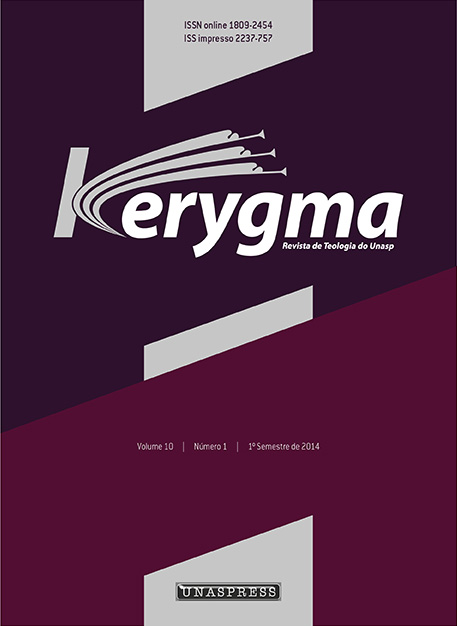IS PLATINGA'S ARGUMENT FOR GOD INCOMPATIBLE WITH HUMAN FREE WILL?
Palavras-chave:
Alvin Plantinga, Argumento ontológico modal, Argumento do livre-arbítrio, Wes Morrison.Resumo
Wes Morriston escreveu alguns artigos afirmando a incompatibilidade do Argumento Ontológico Modal de Alvin Plantinga e o Argumento do Livre Arbítrio contra o problema do mal. De acordo com ele, o Argumento Ontológico Modal defende um Deus essencialmente bom e livre em oposição ao Argumento do Livre Arbítrio, que defende que o melhor tipo de liberdade é a liberdade significativa, justificando a pessoa de Deus ao nos criar com tal liberdade. Nesse trabalho tentaremos resumir os argumentos e a posição de Morriston. Concluindo, veremos que há razões para concordar com ambos os argumentos de Plantinga sem entrar em contradição.
Palavras-chaves: Alvin Plantinga; Argumento ontológico modal; Argumento do livre-arbítrio; Wes Morrison.
Abstract: Wes Morriston has written a few articles claiming the incompatibility of Alvin Plantinga’s Modal Ontological Argument and the Free Will Argument against the problem of evil. According to him, the Modal Ontological Argument defends an essentially good and free God in opposition to the Free Will Argument, which defends that the best kind of freedom is the significant freedom (SF), justifying God creating us with such freedom. In this paper, we attempt to summarize the arguments and Morriston’s position. In conclusion, we will see that there are reasons to agree with both of Plantinga’s arguments without falling in to a contradiction.
Key words: Alvin Plantinga; Modal ontological argument; Free will argument; Wes Morriston.
Downloads
Referências
AUGUSTINE; WILLIAM, T. (Ed.). On free choice of the will. New York: Bobbs-Merrill, 1964.
DAVIDSON, R. Satan’s celestial slander. Perspective Digest, v. 1, n. 1, p. 31-34, 1996.
DAVIDSON, R. The use of Nisdaq in Daniel 8:14. Journal of tthe Adventist Theological Society, v. 7, n. 1, p. 107-119, 1996.
FEINBERG, J. No one like Him: the doctrine of God. Wheaton: Crossway, 2006.
FLINT, T. The problem of divine freedom. American Philosophical Quarterly, v. 20, n. 2, p. 255, jul. 1983.
LEFTOW, B. God and necessity. Oxford: Oxford University Press, 2012.
LEFTOW, B. Rowe, Aquinas and God’s freedom. Philosophical Books, v. 48, n. 3, p. 185-206, jul. 2007.
MORRISTON, W. Is God free? Reply to Wieranga. Faith and Philosophy, v. 23, n. 1, p. 93-98, jan. 2006.
MORRISTON, W. Is God significantly free? Faith and Philosophy, v. 2, n. 3, p. 257-264, jul. 1985.
MORRISTON, W. What is so good about moral freedom? The Philosophical Quarterly, v. 50, n. 200, p. 344-358, jul. 2000.
PLATINGA, A. God, freedom and evil. Grand Rapids: Eederman Publishing, 1974a.
PLATINGA, A. The nature of necessity. Oxford: Oxford University Press, 1974b.
PRUSS, A. The essential divine perfection objection to the freel will defense. Religious Studies, v. 39, n. 3, p. 211-223, jun. 2003.
SENNETT, J. F. (Ed.). The analytic theist: an Alvin Plantinga reader. Grand Rapids: Eerdmans Publishing, 1998.
SENOR, T. Defending divine freedom. In: KVANVIG, J. (Ed.). Oxford Studies: Philosophy of Religion. Oxford: Oxford University Press, 2008.
ST. ANSELM. Proslogion, In: CHARLESWORTH, M. (Ed.), St. Anselm's Proslogion. Oxford: OUP, 1965.
WIERENGA, E. Perfect goodnes and divine freedom. Philosophical Books, v. 48, n. 3, p. 207-216, jul. de 2007.
WIERENGA, E. The freedom of God. Faith and Philosophy, v. 19, n. 4, p. 425-436, 2002.
Downloads
Publicado
Como Citar
Edição
Seção
Licença
Declaração de direitos autorais
Em síntese, autores que publicam na Kerygma devem concordar que:
-
Após a aceitação, os direitos autorais dos artigos são transferidos à Kerygma.
-
Todo material de terceiros utilizado no texto deve estar corretamente referenciado.
-
Os autores devem possuir autorização para uso de imagens, tabelas e demais materiais gráficos.
-
Os autores asseguram que o texto é original, de sua autoria, e não foi submetido ou publicado em outro veículo.
-
As ideias e opiniões expressas são de responsabilidade exclusiva dos autores, não refletindo necessariamente a posição da revista.
-
Os editores reservam-se o direito de realizar ajustes textuais e adequações às normas editoriais.
-
Os autores mantêm os direitos autorais e concedem à revista o direito de primeira publicação, sob licença Creative Commons Atribuição–Não Comercial 4.0 Internacional.
-
Os autores autorizam a reprodução e adaptação do material pela Kerygma, mediante participação ou autorização expressa quando necessário.
-
A revista poderá distribuir, armazenar, arquivar e disponibilizar os artigos por quaisquer meios físicos ou digitais, gratuitos ou pagos.
-
Os autores podem firmar contratos adicionais para distribuição não exclusiva do trabalho, com menção à publicação original na Kerygma.
-
A reprodução integral ou parcial dos textos em outros meios requer autorização prévia e escrita do editor.
-
Os autores são autorizados e incentivados a divulgar seus trabalhos online antes ou durante o processo editorial, visando ampliar seu impacto acadêmico.










